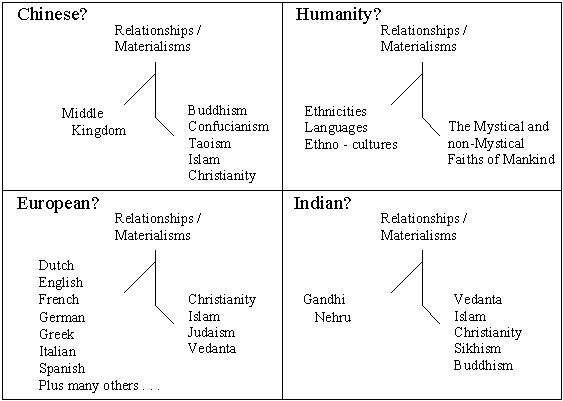![[Lao Tzu, quotations]](mysticism.gif)
quotation, quote, desire, secret essences, outcomes
Lao Tzu, Taoism, Tao Te Ching,
Confucianism![[Lao Tzu, quotations]](mysticism.gif) quotation, quote, desire, secret essences, outcomes |
| Home > Sources of Quotations > Lao Tzu |
|
|||
| The essentials of Taoism's philosophical and
mystical beliefs can be found in the Tao Te Ching (The Way and
Its Power), a text dating from about the third century B.C.E.
(i.e. Before the Common Era aligned with B.C.) The Tao Te Ching
is not the work of one author but is assembled from the works of
several writers who were variously inspired by the life and
teachings of Lao Tzu who lived in the sixth century B.C.E. These
essentials were reinforced and further developed in the Chuang
Tzu, another work that had several authors but which is usually
associated with the main authorship of Chuang Tzu.
From the early days of Taoism as a religion there was a rivalry with Confucianism. Confucianism encouraged the individual to conform to the accepted moral standards, and duties, of an idealised social system. Taoism, on the other hand, preferred that individuals should ignore the moralistic dictates of society and seek only to conform with eternal patterns of the universe, the Tao or Way. This Tao or Way cannot be "intellectually understood" much less described in words!!! A certain Power was held to associate itself with those who
lived in accord with Tao. Individuals should rely on the impulses
arising from their own essential nature and not on accepted
idealised systems of morality as a guide to their
behaviour. Some Lao Tzu Tao Te Ching quotation & quote is presented below.
More quotes that are attributable to Chuang Tzu can be found on
our "Central" Taoist mysticism page and our "Other" Spiritual
Insights page:- A journey of a thousand miles must begin with a single
step.
Truly, "Only he that rids himself forever of desire can
see the Secret Essences. |
|

Spirituality and the wider world
Other pages at age-of-the-sage persuasively consider Outcomes!!!
![]()
Those who know do not say,
Those who say do not know.
![]()
Learning consists in adding to one's stock day by
day. The practice of Tao consists in subtracting day by day:
subtracting and yet again subtracting until one has reached
inactivity.
![]()
Which of you can assume such murkiness, to become in
the end still and clear?
Which of you can make yourself inert, to become in the end
full of life and stir?
![]()
Start of Taoism - Lao Tzu and the
Tao Te Ching quote page